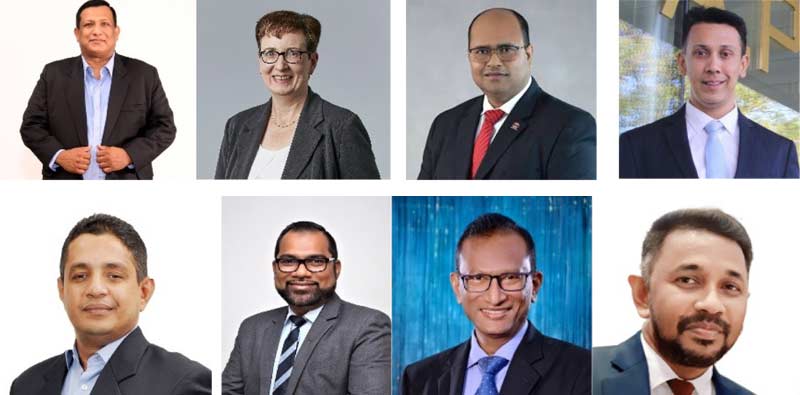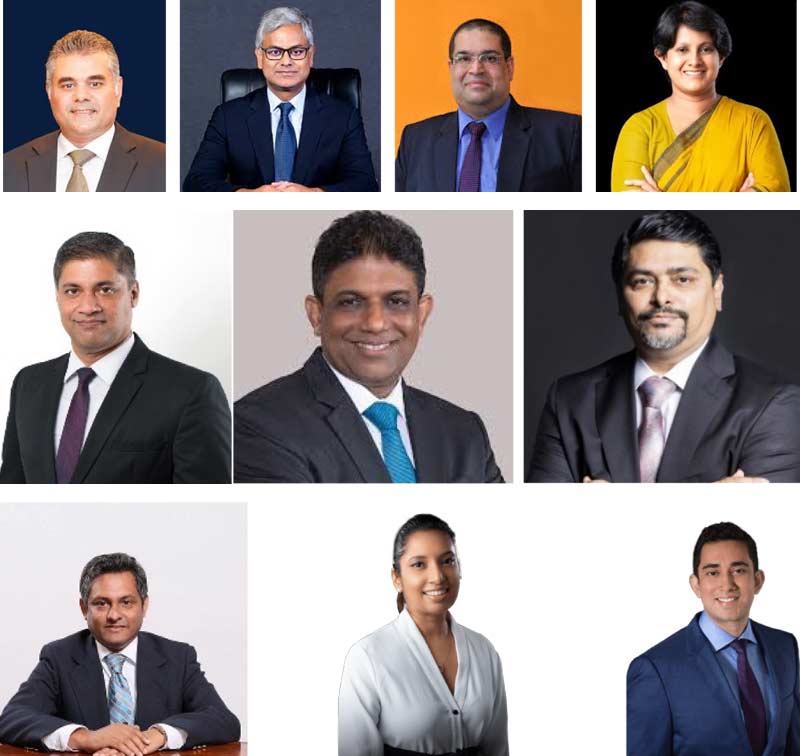Wednesday Feb 18, 2026
Wednesday Feb 18, 2026
Monday, 25 November 2024 01:45 - - {{hitsCtrl.values.hits}}

Hawks Colombo CEO Anuradha Harasgama, Hamburg Port Consulting Associate Partner Christina Prieser, Lanka IOC Managing Director Dipak Das, Maersk Line ESG and Public Affairs, South Asia Group Public and Regulatory Affairs Head Pashant S. Widge, John Keells Holdings President – Transportation and Plantation Sectors Zafir Shahim, GAC Group of Companies Director – Logistics Navin Perera, South Asia Gateway Terminal COO Upul Jinadasa, and Sri Lanka Ports Authority Managing Director Ganaka Hemachandra
Two key topics will be discussed with eminent industry personnel on the 2nd and 3rd days of the 7th edition of the Colombo International Maritime and Logistics Conference which starts on 27 November at Cinnamon Grand. These two fireside chats will add a macro picture for Sri Lanka along with 11 sessions on key industry developments at the conference.
Future fuels, planet and shipping - clean energy efficient integrations, green robotics in port:
Fireside chat 1 will ignite a discussion on future fuels (ship bunkering) and the second half will migrate into port technologies and automation. The call for global reduction in carbon emissions and other harmful gases by the UN has led to new demands which include new forms of energy to fuel ships and to effectively run ports and reduce the carbon footprint which is affecting the planet’s health. This transition requirement comes from the global organisations (COP 29). Consumer behaviour increasingly requires the manufacturers, and all intermediaries involved in the global supply chains to move towards sustainable resource usage. The competition in the sector is focusing on green energy and robotics with automated terminals as sustainable solutions for the development of new infrastructure to support global trade and to attract business. This discussion will bring in salient points for the ports and shipping sector to be relevant and to be competitive in providing planet-friendly solutions as well as to attract new investments to increase business with greener sustainable solutions & best management practices into shipping hubs. The ports in South Asia also need to upscale to sustain shipping traffic by catering to the demand by shipping lines and other customers.
Fireside chat 2: The big picture
Targeting 5% or $ 6 billion from logistics to GDP in Sri Lanka by 2030. What can Sri Lanka do to compete in the transhipment and logistics business? Can we sustain manufacturing? How can we be a part of the global supply chains through value addition? More listed logistics companies and promotions, is it a good answer for capital and investment attraction into logistics?
The shipping and logistics industry in Sri Lanka contributes a mere 2% to the national GDP although the port of Colombo has been the number one transhipment hub in South Asia for decades as reported by the Central Bank. Whereas, in developed logistics hubs around the world, they contribute 7%-15% to GDP. In a modest target, Sri Lanka should look at reaching 5%+ from this sector by 2030 as global logistics is set to reach $20 trillion by 2033. Having a location alone is not going to bring value added services or expansion of investments as the trade geography is changing. An investor friendly environment and consistent policies with ease of doing business for global transactions will only attract capital, know-how and knowledge in transforming the macro economy.
To be an export-based economy, the country needs to uplift its logistics industry to provide customer-based solutions with speed to market reliable solutions. Sustaining with value added manufacturing and to connect to global supply chains is a vital component if Sri Lanka needs to increase its export output. What is needed are strong legal reforms and a consistent policy framework to support exports and implementation of a digital economy that will bring in efficiency and reduce transaction costs. There is also the importance of an independent professional regulating body to monitor the market and bring in time to time reforms to facilitate trade.
The country must think of promoting global partnerships, JVs and PPPs and looking at new solutions, including getting the message to the world about the country and its opportunities- simply a strong marketing effort. Divesting shares by listing companies at the CSE to attract FDI can be a solution as witnessed in the recent past. Have more trade events locally and globally to promote the destination. More free ports and free zones will attract global volumes of cargo if done in a timely and professional manner which can create a large amount of employment and increase revenue. This session will discuss with industry experts, short, medium and long-term macro measures to achieve a reasonable contribution of 5% to GDP or $ 6 billion by 2030 from the logistics industry in Sri Lanka by increasing trade flows, services via our ports and contributing a larger portion to the services export industry. More details on www.cimc.lk
Go Green conference concept
CIMC Events has taken a new initiative in the 10th year, the 7th edition of the conference and is making an effort to make the 3-day conference a Carbo Negative conference. This will be a first for a Sri Lankan conference to move towards sustainability.
The Colombo International Maritime and Logistics Conference signed an MOU with Planetary Carbon Standards who will guide to do so with The Global Integrity in Carbon Management process.

From left: Jafferjee Brothers Managing Director Saif Jafferrjee, John Keells Holdings Chairperson Krishan Balendra, CEAT Kelani Tyres Managing Director/CEO Ravi Dadlani, Verite Research Director Subhashini Abeysinghe, Colombo Stock Exchange Chairman Dilshan Wirasekera, Standard Chartered Bank Sri Lanka CEO Bingumal Thewarathanthri, CEMS Global, USA Group CEO S.S. Sarwar, CIMC Events Founder Chairman Rohan Masakorala, TWCorp Senior VP Natasha Silva, and Senior Advisor Umair Ismailp